All in the Family

Some of Vero Beach’s oldest businesses remain in family hands today
BY MILT THOMAS
Just about every community, town or city had its origins with pioneer families who, sometime in the past, decided to put down roots in a particular location. They may have settled because nature provided a means of survival (farming, hunting, fishing), but as their communities grew and economies developed, those families diversified by providing services that catered to their neighbors. Then a second wave of settlers came with skills and enterprises further fueling the growing community.
Over time, settlements became communities, then cities. Businesses created by earlier settlers either changed hands, moved on or failed. But some weathered all those changes and still exist today, operated by descendants of those early settlers. As Vero Beach celebrates its centennial year, we recognize some of those businesses and the families who started them.
DUBOSE-WADDELL
DuBose is a name synonymous with Vero Beach. The lineage began in 1912, when an itinerant ordained minister, optometrist and jeweler, James Calvin (J.C.) DuBose (1878-1953), came by bicycle from his home in White City. He saw the potential even though Vero was only a handful of souls. He preached, performed marriages and officiated at funerals as early as 1913 in Narrows, Sebastian, Wabasso, Winter Beach, Vero, Okeechobee, Fort Drum and Fort Pierce. DuBose opened a store, the Jewelry Gift Center and by 1915, the First Baptist Church of Vero was established to serve the spiritual needs of 15 of those souls. Later, DuBose founded the First Baptist Church of Wabasso.
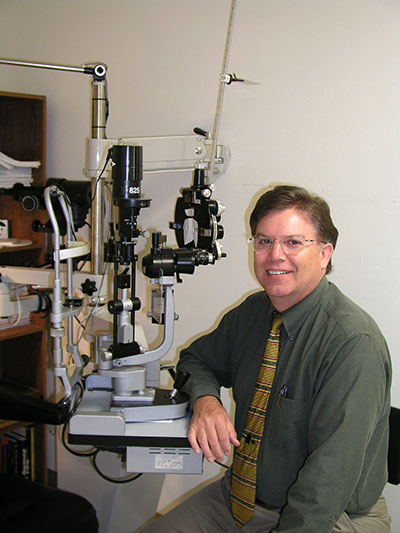
He began practicing optometry in 1919, the same year Vero became incorporated. By then he had moved his family to Vero and opened his first business on Old Dixie Highway. DuBose helped start the Vero Beach Chamber of Commerce in 1923 and served as its second president for 10 years. He also served on the Vero City Council. In 1925, he and 129 other civic leaders went by train to Tallahassee and convinced the legislature to create Indian River County from the northern section of St. Lucie County.
In 1923, J.C. DuBose’s daughter, Ruby Pearl (1903-1996), married Beckett Quay “B.Q.” Waddell (1901-1988). Waddell had moved from Washington, Georgia, to Sebastian at age 10 to earn a living as a fisherman, but in 1921 he was hired at the Vero train station. He eventually became the station agent for the Florida East Coast Railway in Wabasso, a position he held for the next 43 years. Their son would later take over one of the DuBose businesses.
In 1933, DuBose decided to concentrate on his optometry practice and in 1934 his son, Oscar (1900-1956), took over the jewelry store, moving it to 14th Avenue where it would remain well into the 1990s. It was known then as DuBose and Son Jewelers.
Oscar DuBose’s son, Robert (1927-2018), joined the family jewelry business in 1949 after serving in the Navy during World War II. He took over management after Oscar’s untimely death in 1956. He ran the business and saw it begin to expand beyond Vero Beach. He also served on the Vero Beach City Council.
In 1950, J.C. DuBose sold his optometry practice to his grandson, B.Q. Waddell Jr. (1928-2001).
Robert DuBose and his wife, Patsy, had three sons, John, Ray and Mike. At the height of the Vietnam War when a lottery determined when and if a person would serve, all three sons were picked in the same lottery. Ray and John went on to serve in Korea, one as a tank commander and the other as an office worker, but both of them bunked together, strictly by chance. Mike, as the third son, did not have to serve.
John became a schoolteacher in Stuart after his years of service but later joined the business. Ray ran the DuBose Jewelry Vero Mall store and Mike ran the downtown location. Mike learned to engrave as a junior in high school, and this skill became his specialty in the jewelry business. After high school, in 1971, Mike also drove a school bus for several years, just as his father had done during World War II at the age of 13.
By the 1980s, DuBose Jewelry operated seven stores, six of them from Melbourne to Stuart and one store in Okeechobee. But with a severe recession in 1990, the business shut down and reopened three months later in its current location on Old Dixie Highway in Vero. John went back into teaching and is now retired. Mike continued operating the downtown store.
Mike’s son, Todd, is now running the day-to-day operations at the jewelry store. He joined the company in 2001 after school, the fifth DuBose generation. His brother, Tim, works for the Travelers Insurance Company. According to Mike, he expects the family business to continue. “Todd’s daughters worked in the store while in school and I have three grandboys coming up.”
Meanwhile, J.C. DuBose’s son-in-law, B.Q. Waddell Jr., ran the optometry practice for 48 years until he retired, at which point his son-in-law, Dr. Craig Horner (married to Waddell’s daughter, Phyllis), took it over. Horner still practices in Vero Beach.
Interest in politics has run through both families over the generations. J.C. DuBose and his son, Bob, as well as B.Q. Waddell Jr. and B.Q.’s son, Gene Waddell, have held political positions at the city and county level.

SEXTON/TRIPSON
Waldo Emerson Sexton (1885-1967) is probably the first name recognized by newcomers to Vero Beach. Although the only “monument” to his memory is Sexton Plaza, he was responsible for several iconic buildings and plenty of evidence to prove he left his mark on the city’s history and quality of life.
Waldo sold agricultural tilling machines for a company based in Cleveland, Ohio, when he first visited what would become Vero Beach in 1913. After spending a few extra days in the downtown area due to a late arriving expense check, he liked the area so much he decided to stay, bought 120 acres of land and went to work as a salesman for the Indian River Farms Company. He subsequently started raising cattle, created a dairy farm and grew citrus.
With Arthur McKee, a cousin of Charles McKee who held the patent on the tilling machine Waldo was selling when he arrived in Vero, he developed McKee Jungle Gardens in an effort to save the exotic tract of land from development. He also started Indian River Citrus League as well as the Oslo Packing Company with his first cousin, Walter Buckingham. Buckingham then opened an insurance business with John Wheeler, a college friend of Waldo. It still exists to this day. The Vero Dairy that Sexton started in 1924 later became Tripson Dairy and was run by his son-in-law, John Tripson. Tripson milk products were a local staple in nearly everyone’s refrigerator until the dairy closed in 1979.
Waldo was probably most famous for the buildings he created with artifacts purchased from Palm Beach mansions that were being razed and items and wood he recovered from walks on the beach. The structures were built with no particular architectural plans or standard building materials. One that he built as a beach house for his family became the Driftwood Inn, and others include the Ocean Grill restaurant, The Patio restaurant and Szechuan Palace, west of the downtown area. Those iconic buildings are still in use, and McKee Botanical Gardens exists due to a citizen effort to save some of the original McKee Jungle Gardens from development.
Ralph Waldo Sexton (1927-2014), the oldest son of Waldo, continued to own and operate most of his father’s landmark properties, although the Driftwood Inn was sold. His main focus was cattle, yet he became a vocal advocate of beach preservation and maintaining the community’s unique quality of life.
He served 22 years on the Indian River County Planning and Zoning Commission and as chairman of Save Our Shores.
In 2007, the family’s 462-acre Treasure Hammock Ranch became the first property in Florida to receive a conservation easement, protecting it in perpetuity from development.
Ralph’s son and Waldo’s grandson, Sean Sexton, is probably most famous around town as a widely recognized artist and poet, but his “day job” is still managing the cattle operation at Treasure Hammock Ranch along with his son, Michael, the fourth generation of the family to be involved in the ranch. The Sexton and Tripson multi-generational clan is involved in one way or another with all the existing portfolio of landmarks and operating businesses started by Waldo.
Randy Sexton Jr., another of Waldo’s grandsons, runs the family groves as well as the Sexton Tree Farm. His brother, Bobby, is president of the Oslo Citrus Growers Association, which evolved from Waldo and Walter Buckingham’s Oslo Citrus Packinghouse. Bobby’s wife, Marygrace, is CEO of internationally-known Natalie’s Orchid Island Juice Company, which she founded in 1989. Their daughter, Natalie, whose name is on the label, is marketing director for the company.
GRAVES
The Graves Lumber Company was formed in 1895 as a logging business in Alabama started by James Edwin Graves Jr. and his brother, Walter Graves. They harvested trees and floated logs to sawmills. The brothers moved to Florida and established a company town in Pine Log (known as Hosford today), Florida. In fact, they built the entire town.
By 1906 they owned extensive holdings in Florida. In 1919, they formed Sebastian Land Company and purchased 32,000 acres of what is now Indian River County (the seller was Bion H. Barnett, founder of Barnett National Bank in Jacksonville). In addition to turpentine stills and timber, they raised cattle and grew fruits and vegetables, venturing into the citrus business in 1921.
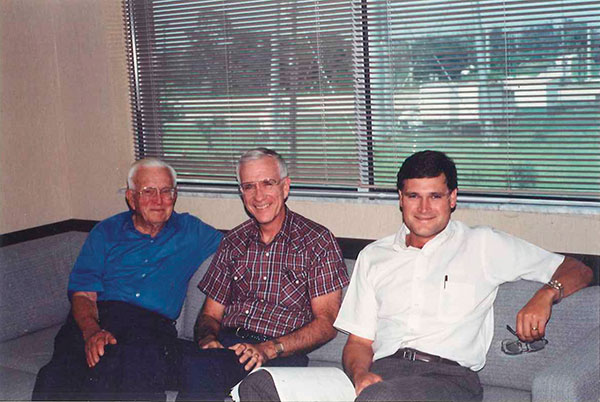
The brothers moved their base of operations to Wabasso in 1928, bringing many of their employees with them. The West Wabasso African-American community of today began with many of those workers.
The Graves Brothers bought their first packinghouse that year, then built a new one in 1930 that stands today on the south side of CR 510 at U.S. 1, although not in use. The Graves Brothers Company moved its offices to the original 1928 packinghouse on U.S. 1.
James’ son, James Richard “Rip” Graves (1907-1999) started working for the company upon graduation from the University of Florida in 1929 with a degree in accounting. He started as a bookkeeper for his father and Uncle Walter.
The Great Depression brought hard times, forcing the company to sell much of its land holdings, so Rip and his wife, Addie (1902-1993), left for a distributorship with Sinclair Oil Company. Then when World War II came and oil production was diverted to meet war demands, Rip worked at the Naval Air Station in Vero Beach and volunteered with the Coast Guard.
After the war ended, Rip and his father purchased Walter’s share of the business from his family. By now they were a fully integrated citrus operation — production, harvesting, packing and selling. Rip ran the company from 1946 to 1976, expanding the company’s operations beyond Indian River County. Rip Graves was inducted into the Florida Citrus Hall of Fame in 1972.
Rip handed over ownership of the company to his son, James Richard Graves Jr. (1938-2006) who was known as Richard, and daughter, Elizabeth Graves Bass, in 1976, although he continued to run it. Richard had joined the business in 1969 and took over as president in 1983.
Richard was involved in politics for many years, even making a bid, albeit an unsuccessful one, for a seat in the state legislature in 1990. In 1987 he was national chairman of the United Fresh Fruit and Vegetable Association and at another time was board chairman of the Florida State Chamber of Commerce, the first in his industry to hold that position.
He was joined in the citrus business in 1991 by Elizabeth’s son and founder James Edwin Graves Jr.’s great-grandson, Jeffrey Edwin Bass. Jeff Bass is now president and CEO.
Today the company owns and manages more than 8,000 acres of citrus, vegetable and cattle land. Other members of the Graves family are also in citrus and other local businesses.
MACWILLIAM
Alexander Duncan MacWilliam (1891-1966) was born in Edinburgh, Scotland, and emigrated to the U.S. with his parents in 1907. They settled in Cleveland, Ohio, and when the U.S. entered World War I in 1917, he joined the infantry. He served in France, but after suffering several wounds, including damage from a mustard gas attack, he was sent home. MacWilliam’s doctor recommended recovering in a warm climate so he moved to Florida, specifically to the small town of Vero, where his doctor and several other families from Cleveland had established a beachside colony.
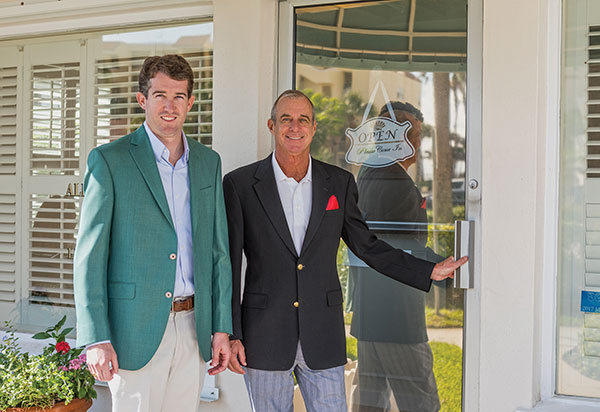
In 1919, MacWilliam arrived at what was then known as the “Cleveland Colony” on a stretcher in a rowboat as no bridge existed at the time. From that point forward, he was to have a major impact on the city we know today as Vero Beach.
His first job was to manage and develop a new community named Riomar. MacWilliam was proficient in landscape architecture so he designed and built the Riomar Golf Course as well as the clubhouse. He went on to supervise construction of homes and would remain active in real estate until he retired in 1951.
But his vision for the future of Vero led him to take a leadership role in making that vision a reality. Vero at that time was part of St. Lucie County, and in 1925 he joined other community leaders in an effort to establish home rule by creating a new county that he named Indian River. About that time, a bridge was built connecting the barrier island and the mainland, resulting in a name change to Vero Beach.
MacWilliam became mayor in 1927, a position he would hold three different times, from 1927-35, 1939-45 and 1949-51. He also served five terms in the Florida Legislature.
During his years of service, he started the first mosquito control district, knowing that Vero Beach had great potential as a tourist destination if the city first did something about those pesky insects. He introduced building height restrictions that still define the city skyline today. When the Army Corps of Engineers dredged the Indian River Lagoon, he influenced the channel placement in anticipation of a planned concrete bridge, helping to appropriate funds for the project while serving in the legislature. He also had Army Corps engineers deposit dredged sand in an area that would become Riverside Park and Memorial Island, his tribute to fellow soldiers who did not survive the war. MacWilliam helped to bring commercial air service and the Brooklyn Dodgers to Vero Beach.
Even though MacWilliam was involved in real estate from the beginning, it was his son, Alex Jr. (1924-2012), who established the Alex MacWilliam, Inc. Real Estate Company in 1949. At that time he was one of four real estate agents in town. After having left to serve in the Army Air Force during World War II, he never again left Vero Beach except for vacations. He established his own legacy as one of the founders of Indian River Shores, serving on its town council almost 20 years. MacWilliam Jr. was also a founding member of the Indian River Farms Drainage District and served on the Mosquito Control Board his father had founded, finally retiring in 2010.
His son, Alex “Buzz” MacWilliam III, went to college thinking he would become a lawyer, but his father convinced him to join the real estate company in 1980. MacWilliam III took over most of the business by the 1990s with his partner and brother-in-law, Joe Beasock.
Today the firm employs more than 70 sales and office staff, including his son, Alex MacWilliam IV, who joined the firm in 2013 and is now a broker/office manager. “I went to Ole Miss to study marketing and worked a while before deciding to come back to Vero and join the company. I had no desire to do that after graduating from high school, but after spending almost five years away in college and working, I missed Vero and the business became more and more attractive.”
VOCELLE
The Vocelle family business is law and they are included here, even though the third generation of Vocelles may be the last to follow this path. Their impact on our community will extend far beyond the current generation.
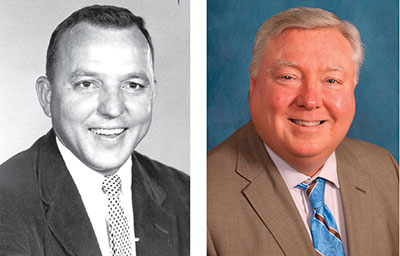
James Thomas Vocelle (1897-1992) was born in St. Marys, Georgia (just over the Florida-Georgia line), a fifth generation in that town and descended from the original Acadian French Canadian Catholic settlers. He published a well-known book for those studying Acadian history called “The triumph of the Acadians: a true story of Evangeline’s people: by a descendant,” He earned his law degree, served in the military, completed two terms in the Georgia House of Representatives and was elected to the state senate — all by the age of 25. His run for senate was marred by violence as the Ku Klux Klan took shots at his home and a cousin intercepted KKK members on their way to firebomb his home. He was targeted not for his civil rights advocacy, but because he was Catholic. He was not allowed to take his seat in the senate due to anti-Catholic sentiment in the state’s senate.
Vocelle and his wife, Mary (1901-1993), decided he would have no future in Georgia, so they moved, first to Santa Fe, New Mexico, then back east to Vero Beach in 1924 so he could take a position as city attorney. A year later he joined 129 other community leaders on a train to Tallahassee where they lobbied for the establishment of Indian River County. That effort was precipitated by a St. Lucie County sheriff raid on the Florida Theatre for showing movies on Sunday. Vocelle and his partner, Paul Niles, editor of the Vero Press, represented the theater owners at the time.
Over his six decades of private and city law practice in Vero Beach, he was a top advisor to five Florida governors and served his community in many ways. He used his influence to win federal money for construction of a county courthouse in 1935. Vocelle was known throughout his career in Georgia and Florida as an advocate for the downtrodden. He and Mary were married for 72 years. Vocelle passed away in 1992 at the age of 95.
His son, Louis B. “Buck” Vocelle (1926 -1996), served as a city and county attorney for many years in Vero Beach. He represented many African-Americans and supported civil rights legislation. He became a candidate for Congress in 1962 and, just as his father endured attacks by the Ku Klux Klan, Buck “earned” a Ku Klux Klan cross burning at his home. He was unsuccessful in that election, but Gov. Bob Graham later appointed him as circuit judge in 1979. He became Indian River County’s chief judge and had a hand in designing a new county courthouse that was built in 1991, just as his father was involved in construction of the original county courthouse. Judge Vocelle, as he was known, passed away in 1996.
Louis B. “Buck” Vocelle Jr. has continued the family tradition as a private attorney in Vero Beach. Born and raised here, he distinguished himself in law school and was awarded an internship with Justice Ben Overton of the Florida Supreme Court. He is double board certified, AV rated, was chairman of the Florida Bar Professional Ethics Committee and earned many other distinctions. He is also very active in the community.
Will the family tradition continue? “Not at this point,” he says, but adds he recently became a grandfather so there is hope for a future Vocelle attorney in Vero Beach.
OSTEEN
George F. Paddison (1868-1918) opened G.F. Paddison Lumber and Building Materials in the 1890s in the city of Eau Gallie. In 1902, the company opened a second location in Fort Pierce as East Coast Lumber & Supply Company. It still operates in that location to this day.
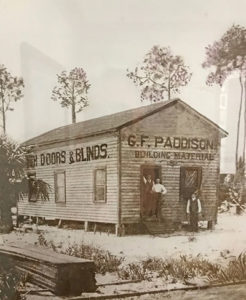
By 1907, East Coast Lumber & Supply added operations in Cocoa and West Palm Beach. At that time, the company’s business was primarily building wooden shipping crates for fruits and vegetables. Within 10 years, the business expanded to 10 locations from Cocoa to Miami. East Coast Lumber purchased an existing building supply company in Vero Beach and began operating in that city in 1949.
Paddison and his wife, Gertrude (1872-1951), had two daughters. One daughter, Mary (1897-1972), married Paul L. Osteen (1898-1958) and they moved to Fort Pierce, where he managed the family lumberyard. He ran the operation until his death in the late 1950s. His widow, Mary, then headed operations until their son, Paul L. Osteen Jr. (1927-1998), took over. He graduated from the University of Florida and went into the service, where he was stationed overseas during the Korean Conflict. He joined the family firm afterward and became president from the 1960s until his death.
Allen Osteen first started working with East Coast as a pre-teen. “I started before high school 45 years ago, mopping floors, loading lumber, generally a stock boy.”
After high school, Allen went to Tulane University, far from his Florida roots. “Then I came back to Florida and went to work for Jay Stein (of the Steinmart stores) in Jacksonville.”
It was there he met his wife, Terry. But he knew his destiny was to return to the family business. “It is a heritage I am very proud of.”
When the opportunity arose in 1989, Allen joined his father and cousin, Don Osteen (son of Howard Osteen, who managed the Cocoa yard and sat on the board of directors). At that point they were restructuring the company. According to Allen, “My father died nine years later, so Don and I managed the company together.”
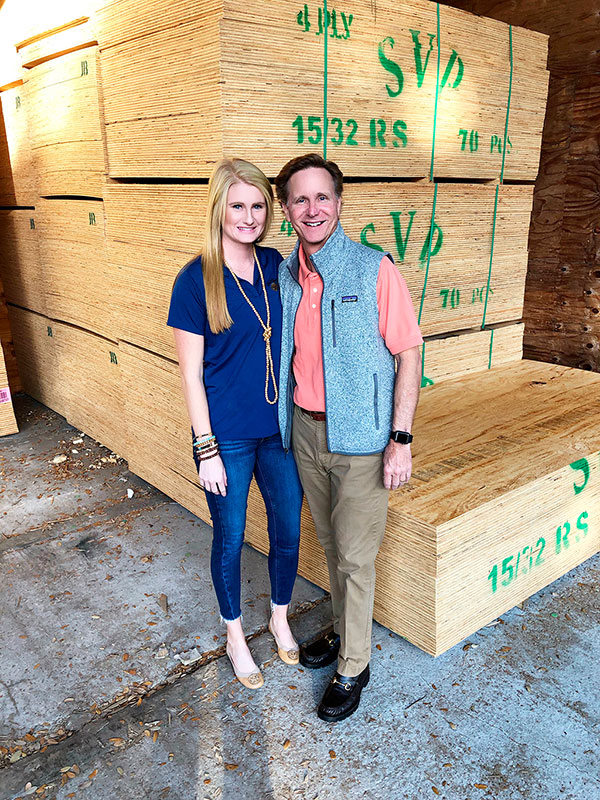
Allen’s daughter, Megan, works in the Vero Beach office as a sales associate, the fifth generation family member. After graduating from Southern Methodist University in 2015 she worked for Fusion Logistics in Dallas for two years.
“It was a hard decision to move back to my hometown of Vero Beach after living in the metropolitan city of Dallas, but I wanted to pursue my life-long dream of working for the family business,’’ she said. “I could not be more proud to be working for a company that has been in my family since 1902. As a 5th generation family member to be working at East Coast Lumber, I am very blessed to have been given this amazing opportunity.’’
East Coast Lumber & Supply today has locations in Fort Pierce, Vero Beach, Cocoa, Melbourne and Stuart.
In 2006, Allen partnered with Gregory Enns to launch Indian River Magazine, Osteen serving as vice president and associate publisher. Allen was named the 2018 Entrepreneur of the Year by Indian River State College.
BANACK
Back in the early pioneer days of J.C DuBose, it was not unusual for a person to own several different and unrelated businesses. That has not been the case for Sidney “Sid” Banack Jr., whose family has been involved with agriculture for generations. He graduated from the University of Florida with a degree in agronomy, planning to start a plant nursery. As fate would have it, he proceeded to have a lengthy career as an insurance agent, broker and owner in Vero Beach. But as his first love was farming, that is what he returned to after selling his insurance agency in 2004.
His grandparents first planted citrus in Brooksville, Florida, back in the late 1800s. Banack’s father, “Big Sid” Banack, worked for United Fruit Company in Central America and his son was born in Puerto Armuelles, Panama, a United Fruit Company employee town in 1932. The family lived next door to a horticulturist who instilled in the youngster a passion for plant life.
The younger Sid moved to Florida and lived with his grandparents while attending high school and college. All this time he planned on having a career in agriculture. In college he met Donna Sue Hague (1934-2011), a Vero Beach native. They married in 1955 and moved to Vero Beach the next year. They would never leave except while Sid worked on his master’s degree at the University of Florida.
Starting a nursery as planned, Sid quickly realized he could not support his family with the business venture. He took a job selling insurance, probably the last job this mild-mannered man would have expected. Yet he excelled at it and ended up working for Florida Farm Bureau for 25 years before opening his own successful insurance agency in 1983. It was subsequently sold in 2004, and Sid “retired” to concentrate on his first love, agriculture.
Back in 1960, at the urging of his citrus growing insurance clients, he decided to start growing his own citrus literally in his 10-acre backyard. Over the years he bought up more acreage and eventually acquired a packinghouse, Quality Fruit Packers. His success as a citrus grower probably would never have been possible if he had not decided on a career with Florida Farm Bureau. That was where he met and befriended many fellow citrus growers and packers who helped him learn the business and become successful.
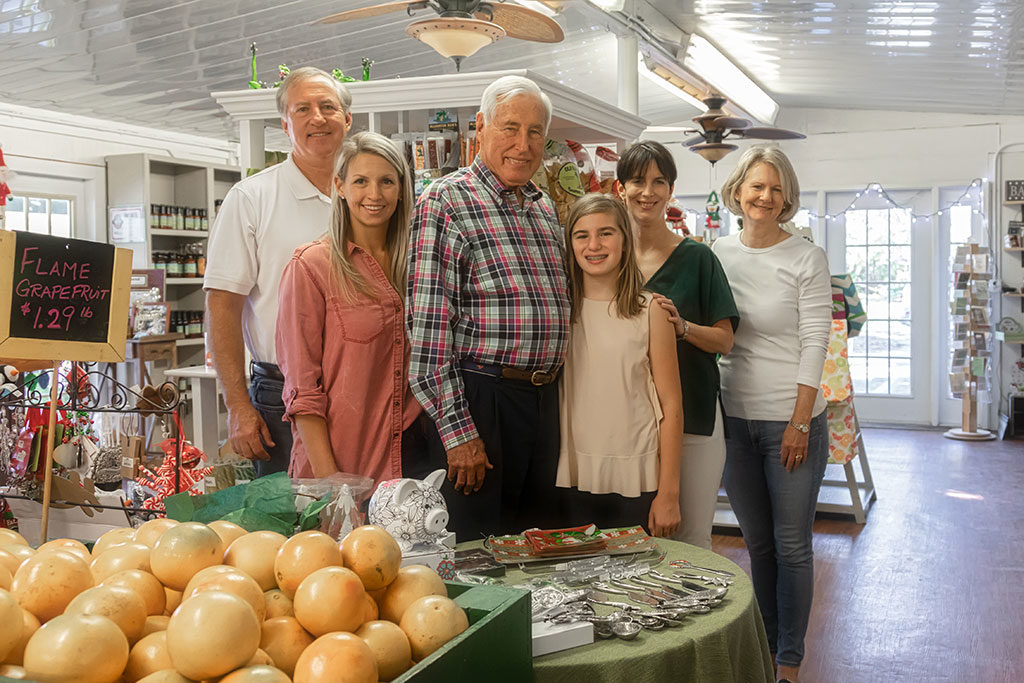
The Banack family next ventured into retail citrus by opening Countryside Citrus, which now has two locations: one on the beach and the other west of Vero. Expanding their agricultural interests in 2006, Sid and son, Rusty, purchased the Lane Southern Orchards of Ft. Valley, Georgia, where they grow, pack and sell pecans and peaches.
Sid’s daughter, Cheryl, went to work for her father in the insurance business, staying for 20 years, and is now involved with Countryside Citrus, which is run by Sid’s sister, Flo, and her husband, Fred Van Antwerp. Rusty received his degree in agriculture from Florida Southern and went directly into the family business. He manages the family’s agricultural interests in Florida and Georgia, and his daughter, Brittany, works at Countryside Citrus. Sid is still active in all of it at age 86.
Milt Thomas came to Vero Beach with his family in 1956. After a career in the music business, he returned to Vero in 1987 and started a second career as a writer and author of 20 books.
Do you have legacy business? Let us know about it.
Call 772.940.9005 or use our contact form
